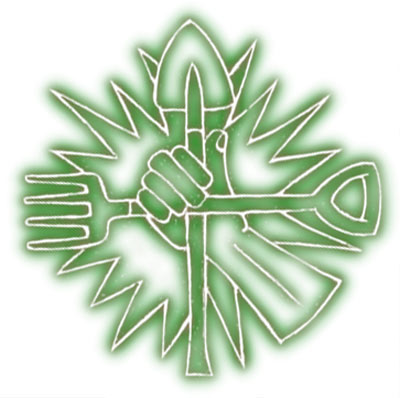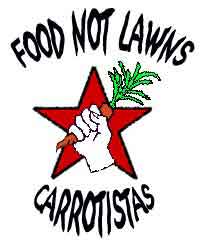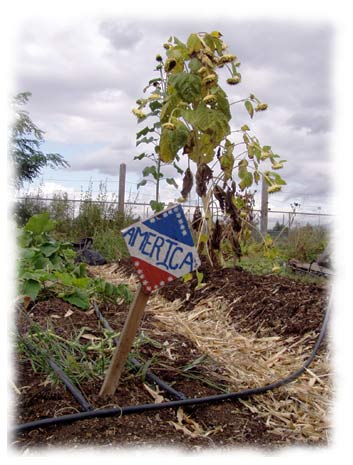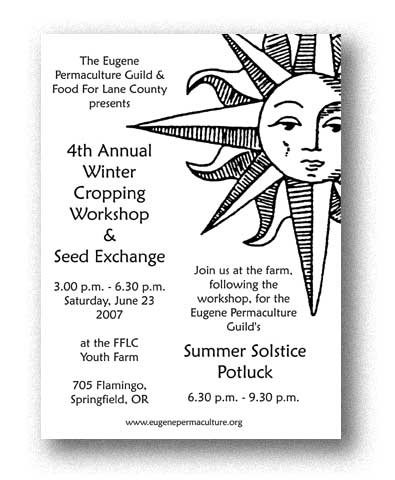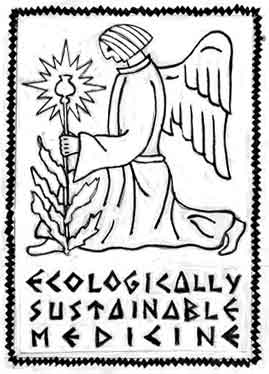__________________
"Few people nowadays know what man is. Many sense this ignorance and die the more easily because of it, the same way that I will die more easily once I have completed this story. I do not consider myself less ignorant than most people. I have been and still am a seeker, but I have ceased to question stars and books. I have begun to listen to the teachings my blood whispers to me. My story is not a pleasant one; it is neither sweet nor harmonious, as invented stories are; it has the taste of nonsense and chaos, of madness and dreams – like the lives of all men who stop deceiving themselves."
- Clark E. Moustakas
Loneliness & Love"We should always look back on our own past with a sort of tender contempt. As long as the tenderness is there, but please let some of the contempt be there, because we know what we are like, we know how we hustle and bustle and shove and push and sometimes use grand words to cloak it; one does. I'm not looking at you specifically, so don't squirm." [laughter]
- Dennis Potter in an interview with Melvyn Bragg,
Channel Four, 1994__________________
Not only am I no stranger to seed swaps hosted in my own bioregion; I have also travelled, carrying seed to share freely. Here is the home page created around my cross-country seed-sharing adventures in 2001:
"...What's a seed swap? The term seed 'swap' is a slight misnomer, because attendees don't actually need to have seed to 'swap' to be welcome to enjoy the free sharing of seed at such events - called 'seed swaps', 'seed fairs' or 'seed exchanges.' All are welcome to pick up seed, including those who arrive completely empty-handed. Seed is abundant."
Two years later, one of my then co-travellers was sentenced to six months in federal penitentiary, in part, for her activities during that trip. "Peg's Prison Party and Seedswap" is a (longish) posting I forwarded to our local permaculture listserv at that time, which outlines the wherefores of Peg's imprisonment; and my hands-on experience of seedswapping as it relates to larger cultural concerns:
"...Yes, indeedee. I have an intuition the size of Mount Everest, that seedswaps will emerge as the defining cultural phenomenon of the New Millenium."

Seedswapping in Georgia
November 2001
A 2005 article I wrote for Permaculture Activist, the foremost north American 'regenerative design' publication, included a section, Seeding the Seed Families, describing one example of how I promoted our major annual, local seedsharing event, the Eugene Permaculture Guild's Spring Bioregional Seedswap:
"...In cultures typified by mutual caring...Seed swaps and seed giveaways are seen not only as strengthening seed culture, but as critical to nurturing and rekindling intra-ethnic and inter-ethnic relations."
October 2006, marks the publication of Heather Coburn Flores' book, Food Not Lawns: How to Turn Your Yard into a Garden and Your Neighborhood Into a Community(Chelsea Green Publishing), which grew out of the visionary horticultural explorations of the Eugene-based avant-gardening collective of that name.
Here's the brief snippet on seedswaps I was asked to contribute to Heather's new book:
"...Local seed swaps are where the deepest indigenous wisdom of land and people become most potentized, shared and enlivened; they stand at the arrowpoint of the evolutionary impulse in any bioregion."
FNL's old website which I created, paints a picture of the collective's early efforts to nurture community interest in deep gardening and seed stewardship. (Here's a more recent website, managed by Heather, the passion behind, and one of the three original co-founders of the FNL collective. Our third founding member, Tobias Policha, now directs the Institute for Contemporary Ethnobotany.)
I live with, as David James Duncan might put it, 'the discretionary funding of the average American dog.' I spend my days pottering around my garden, which is nestled in an organic farm - the Food For Lane County Youth Farm - which I caretake, and where I volunteer-manage the nursery for the School Garden Project of Lane County (SGP):
"...These brief examples give you, I hope, a fuller awareness of how the SGP's central place in efforts to deepen ecological literacy locally, afford us access to resources simply not available to the for-profit community. It's our intention, indeed, to provide a level of service to gardening educators that is simply beyond the reach of the for-profit community."
I have long wrestled with the challenges of nurturing an ecological consciousness within a cultural ethos that often feels largely, unwittingly, opposed to such work. "School Gardens vs. School Schedules" (.pdf) appears in the SGP Spring 2007 newsletter:
"Some souls, not unwise, suggest that if our culture has a future, then we will have to re-pattern our lives and understandings in accord with the cyles of nature. If so, then it is clear the gardener's brand of Paradise involves knuckling down to some strict natural rules. The seasons cannot be moved."
You can 'google earth' my home.
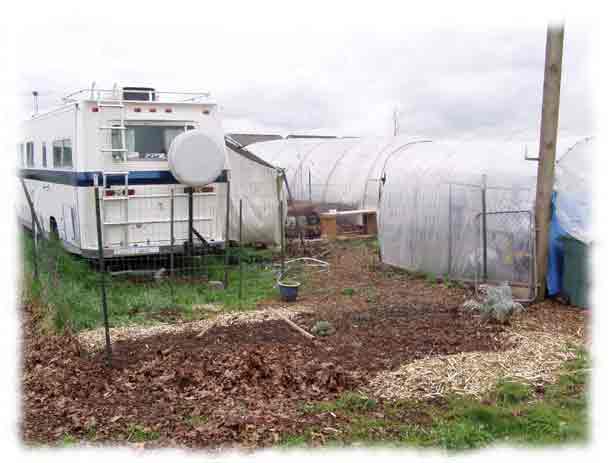
Moving in. Early Spring 2005
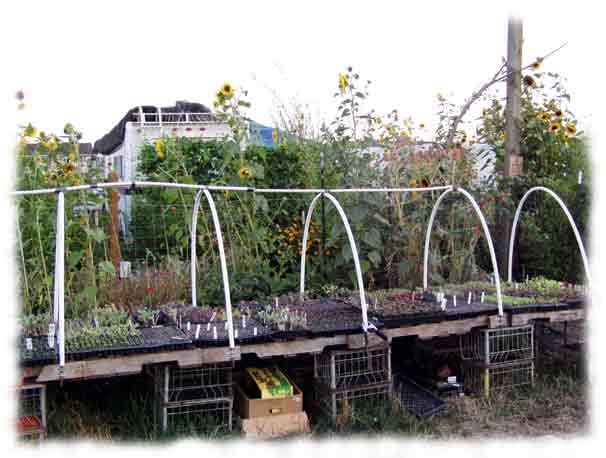
August, 2006
I have a growing interest in the garden at Brattain Elementary School in Springfield. I also play a co-stewardship role in the activities of the Eugene-Springfield Permaculture Guild by, among other things, editing our newsletter, Permaculture News (now moving online).
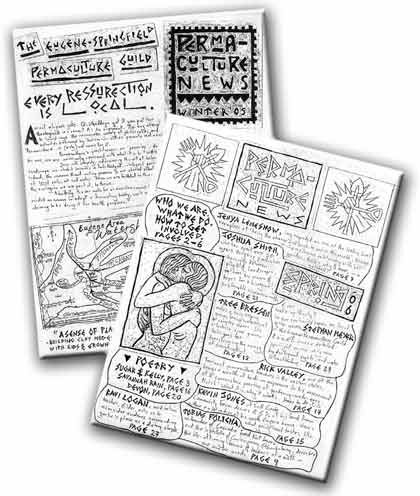
Recent articles I have authored, include 'Tim's Quiet Triumph', a description of Tim Peters' pioneering breeding work with perennial grains:
"...A lifetime devoted to breeding a variety of food crops in domesticated, fertile gardens and infertile, wild mountain situations has gifted Tim precious comparative insight into the fundamentals of robust, long-lived cultures. "There's things that time wll tell you that nothing else will," he remarks."

and additional articles on Spring seeding strategies and tactics for vegetable growers in the S. Willamette Valley; the place of the Oregon White Oak as the defining keystone species for crossover foodshed and ecological restoration efforts in our bioregion:
"...Interestingly, there may be significant synergies between permaculturists' burgeoning efforts to nurture sustainable local foodsheds, and the Long View of local field ecologists, botanists and assorted Deep Nature geeks."
'Healthcare as Peacemaking', a mongraph on Taraxacum officinale; a local gardener's materia medica (here are the relevant .pdf files for these articles) and my brief, first editorial, "Every Resurrection is Local":
"...Ancient religious joke. Q: Whaddya got if you put two theologians in a room? A: An argument. Yup, any attempt to 'word-cage' the innumerable variety of philosophies and activities embraced by 'holism-in-action' presents real challenges. Permaculture is (only) our word for it."
Here's a small blog thread which grew up around efforts I jointly led to create a track devoted to the topic of "Sovereignty and Permaculture" at the Guild's 2004 Bioregional Permaculture Gathering:
"...Perhaps this is what we are attempting at the permaculture gathering - exploring how enlarging our sense of Self to embody what Leopold refers to as an "ecological conscience" is central to the creation of sustainable communities and, what's more, exploring how such covenants to hallow the earth not only weave individuals together, but other communities, too."
The communion of wisdom and community has been an abiding interest for some time, hence an article I penned for the Eugene Zendo Newsletter in November of 2003, entitled "Nick considers Practice, Compassion and Justice":
"...Implicit in Shimon ben Gamliel's observation, I sense, is an insistence that leaping beyond the One isn't simply a private affair. This carries us directly to the heart of a concern with justice, world history, and the prophetic imperative."
Prior to stepping into the greenworld, I bounced around high tech. Among other efforts, I helped jumpstart the National Information Infostructure Awards, in its day the 'Oscars of the Information Superhighway' - which later morphed briefly into the the Global Information Infostructure Awards, before sinking without trace. By then I had moved on to co-found the National Computer Ethics & Responsibilities Campaign with Dr. Peter Tippett (then of Symantec). The Congressional Briefing on Computer Ethics we co-chaired, was responsible, I believe, for hosting the first ever web connection in the U.S. Congress.
Pressing on, I conceived and placed the website for the Save the Earth Artrock Auction; conceived and curated World 3, a metahypermedia exploration of website design which engaged the contributions of many of the world's leading hypertext philosophers:
"...World 3 is about many things but, fundamentally, it is a space about how to use space to communicate."
and managed The Craft for Netscape/Chris Tacy's web-developer newsletter Off The Net. Heady days. Here's a home page from around that time.
After further pondering the implications of emerging technologies, I penned a technical white paper positing the creation of a server-based, dynamic node interaction protocol for the web, superdoubleplus-precised in the August 1996 issue of WIRED - a simple way to take the fabric of the web, now essentially static, interactive; in a sense, 'turning it on':
"...What's the most effective way to strengthen the Web? Strengthen hyperlinking. Create dynamic nodes."
Other web-related articles included Barking Up The Wrong Hierachy, an early take on hypermedia design as it relates to the practice of business; State of Cyberspace, January 1st, 1996; and Web Economics, a tighter version of which ran in the now defunct Ziff Davis magazine, Interactive Week.
I concluded my singular fascination with cyberspace ontology by curating the Electronic Frontier Foundation's consiousness archive, A Space Without A Goal. ASWAG has been described as a "monumental exploration of the morality, and even the theology, of the internet." It's an old website, ported somewhat clunkily around the web through the intervening years, limping, but still fundamentally navigable:
"...Consciousness is collective. All is Flow. All is flow - Alice in Wonderland. All is flow - Heraclitus. All is flow - David Bohm. Consider the lilies of the field, how they grow; they toil not, neither do they spin...using language metaphorically and elliptically to evoke an existential response, a response that cannot be commanded by direct imperatives or elicited by plain normative description. The act of connection is the act of proof. The act of connection is the act of truth. Only interconnect."
Not long after concluding the build of ASWAG, I engaged in what hindsight reveals as a jawdroppingly self-destructive, brutally hamfisted effort to 'change the world', by hunger striking 'at' people. The immediate result of this solipsistic paroxysm of self-righteousness? I was forcibly admitted to the psychiatric ward of Saint John's hospital in Santa Monica where I wrote letters from the psych ward.
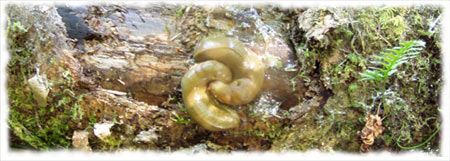
Tao of Slugs, Five Rivers, August 2005
In "Finding Work that Works" an autobiographical sketch I penned for a 2001 issue of Permaculture Activist devoted to the theme of "Right Livelihood", I described the context surrounding my evolving interest in deep gardening alongside the co-founders of the Food Not Lawns collective:
"...I had always assumed the Garden as Paradise was simply a quaint religious symbol, a parable for the masses. A morality tale. Then the dirt got under my fingernails, and the re-education began in earnest."
Holier-than-thou? I don't have a leg to stand on. Impetuousness of youth cannot explain the most egregious chapters of my life. The blindness of trauma, the bitter tanning acids of consequence, remorse, illness physical and mental, the purifying fires of anguish, the redemptive power of hindsight: these are some of the impulses that have fed and continue to nourish my deepening insights into avant-gardening. Here's the full text of the 2005 Permaculture Activist article I authored, "The Roots of Healing," which appeared in an issue devoted to the topic of 'Learning from Our Mistakes.'
"...My personal experience, for example, suggests that moving toward a local response to chronic health concerns actually reveals an intimate relationship between my healing as an individual, and the healing of the culture in which I live, both human and green."
"... Deep gardening for this man, and myself, is a monumental struggle, a constant step into our Shadow. Rumi cuts right to the heart: 'An empty mirror and your worst destructive habits, when they are held up to each other, that’s when the real making begins… Don’t turn your head… That’s where the light enters you...' "
The Fall, Eugene
September 2006
A very large part of the impetus which has me where I am today, grew out of my experiences lurking, somewhat precociously, around the innermost sanctums of the international financial markets in the early- to mid-1980's, where I learned a very great deal about the realpolitik of international capitalism. My earliest major published piece made the cover of the February 1985 issue of Euromoney magazine and reflected a consuming investigative focus of the time: central bank regulation. It was co-authored with Will Ollard, and was titled, "How the Bank of England failed the JMB test." Among other structural constraints, Britain's draconian libel laws played a paramount role in limiting the terms of the piece.
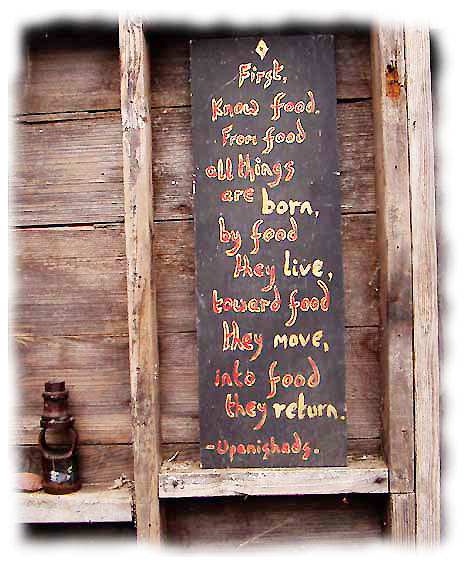
Art by
n. 2000. Photo by n. 2006
Here's an article, Closing the Circle, in the July 13 2006 issue of the Eugene Weekly, describing a recent workshop I co-taught on winter gardening; and a Fall planting calendar I penned for the August 10, 2006 issue. Why am I currently growing 30 varieties of winter cabbage?
"...In the meantime, the Universe has accorded me the immense privilege of living a life which aspires to what Jim Corbett referred to as the Quixotic Principle: 'To open the way, a cultural breakthrough need not involve masses of people but must be done decisively by someone.' "
This article was precised and rehashed as "Deconstructing Civilization With Cabbage" for the January/February 2007 issue of In Good Tilth. "The Future of Farming" is a sister article, describing some insights into plant breeding in ecological context, garnered from my wanderings around local seed stewards in recent years. I penned a brief, highly concentrated synthesis of the two pieces, titled, "Reclaiming the Stolen Harvest" for the program for Seedy Sunday, the UK's largest seedswap, which took place on February 4, 2007. It summarizes the core purpose of the Seed Ambassadors Project.
"...it is hardly surprising that the stewardship of open-pollinated food crops, following nature's designs and meeting nature's needs, is now emerging as a centerpiece of burgeoning efforts worldwide, to reclaim and restore foundational cultural values along ecologically coherent lines - in the implicit image of openness, interdependence, abundance and the regenerative power of Nature."
The Last Call: Sustainable Winter Cropping in the maritime Pacific Northwest, penned in May of 2007, addresses very recent but little-noticed and foundational trends in the 'organic' seed industry and particularly, implications for the ecology of the bioregion of which I am a part. On a related note, I play an active role in attempting to nurture the uptake of winter cropping in the Pacific Northwest, orchestrating an annual workshop and seedswap around this theme.
Here's the 2007 winter-hardy crop table, V2.2, prepared for our June workshop, which reflects our most recent intelligence regarding crop types, varieties, sources, and seeding timing.
How does my work with seed relate to my unequivocal support for Open Source?
"...deep programming and deep gardening sing the very same archetypal song. Essentially what we're doing is heading into Denmark to freely share _embodied_ open source code. In freely sharing the finest open-pollinated seed in the world, we're doing nothing less than nurturing the foundational analog in meatspace, for the open source cyberspace movement. _Literally_ rooting it in the dirt."
My father was a senior international executive with one of the world's largest pharmaceutical companies. How has the blessedly diverse cultural experience of a South-East Asian childhood profoundly touched my life through the years?
"...When, as a young adult, I began filling my shelves with music, I found myself gravitating inexorably toward "world music" - towards the sounds of a multiplicity of global cultures and, in particular, toward fusions, or should I say "communions" of different musical "ethnicities." It occurs to me that this innate predilection for such sonic syncretism was kindled in the gracious receptivity of Kuala Lumpur 's embrace."
Even as I move among clinical and scientific herbalists, I am neither: I am simply a gardener looking to his health, a keen practitioner and exponent of lay healthcare. What is the evolving nature of my experiential interest in ecologically sustainable medicine, especially as it relates to my continuing research into the always-deepening, heartrending paradoxes and subtleties of pain management?
"...this phenomenon simply contradicts the model that sustains for-profit medicine - no matter the latter's undeniable and utterly remarkable capabilities for relieving suffering. It stands at odds precisely because it reveals that the business of medicine is inherently, structurally, fundamentally opposed to a coherent evolution in the pain management paradigm - no matter how cogent, conscientious, humane and scientifically plausible the emerging theraputic modality may be. Hence the dominant requirement to ensure that mutual care and self-medication are treated as misdemeanors or felonies."
"..An effective pain band-aid, a local herbalist tells me it is contraindicated in those who will use the relief it affords to re-injure themselves. Typically it is mixed with other complementary medicinals for safety's sake: the plant is tinctured so that dosage can be precisely monitored. It works well in combination with skullcap, hops, pasionflower and valerian. Typical doses of the single plant tincture start at 3-5 drops - as distinct from dropperfuls. The tincture can be used daily for 6-8 weeks. I have not made this medicine myself, but I am aware that local herbalists are notably more cautious around wildcrafting, processing and using this plant than the very few published sources I have encountered, recommend. As I begin exploring a relationship with this plant, my own experience supports common evidence that it is readily introduced to local gardens and demonstrates all the major characteristics of natives: drought-tolerance, resistance to disease, contentment, friendliness to others, resistance to extinction...and beauty...The botany story is somewhat complex: we are species rich..."
My localizing interest into ecologically sustainable pain management has recently embraced deepening academic research into phytomedicinal approaches, historical and contemporary, to local and general anaesthesia. I am especially interested in the contributions of other-than-western traditions, with an especial leaning toward a dialog with Islamo-Arabic experience.
I penned "Going Local? It's worth it!" for the adult-written page of the March-April 2007 issue of the international children's magazine, Skipping Stones. It's a brief piece intended to alert teenagers to the tangible steps they can take toward living a healthier life.
How is 'process art' manifesting in the social groups I am a part of:
"...Have we reached consensus on consensus, then?" [Laughter]
An October 2005 art project: A New Deck of Cards for Lisa:
"...One of the hardest moments in life, perhaps, is the one in which I discover that there are some things about which I can do nothing at all. I have been bested, and there is nothing whatsoever that I can do about it."
I have a deepening interest in native ecology and, more particularly, the ecologically-coherent integration of native plants and 'exotics' (the vast majority of our food plants are 'exotics') within the local landscape of which I am a part. I played a minor role in helping handhold the Native Plants and Permaculture Gathering at Lost Valley Education Center in May 2007. To our knowledge, this conference marks the first occasion in which the 'natives' and 'exotics' communities have come together, anywhere, to discuss our respective concerns and to explore the potential of common synergies. A working dialog such as this is necessarily rooted in the local.
Recently Noted | Recent Articles| Mugshots 1995 - 2006
"Great things tend to be undoable things. Whereas small things, lovingly done, are always within our reach." - David James Duncan
Erect no gravestone. Just let the rose
bloom every year for him.
For this is Orpheus: metamorphosis
into one thing, then another.We need not search for other names.
It is Orpheus in the singing, once and for all time.
He comes and goes. Is it not enough
that sometimes he outlasts a bowl of roses?Oh, if you could understand - he has no choice
but to disappear,
even should he long to stay. As his song
exceeds the present moment,so is he already gone where we cannot follow.
The lyre's strings do not hold back his hands.
It is in moving further on he obeys.- Sonnets to Orpheus, Part One, V, Rainer Maria Rilke
Last updated, June 23, 2007
